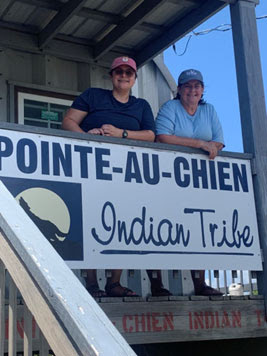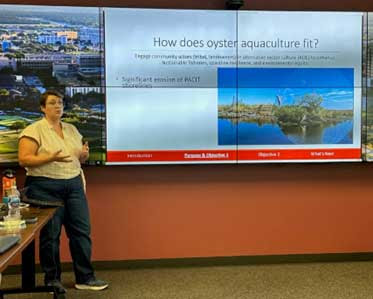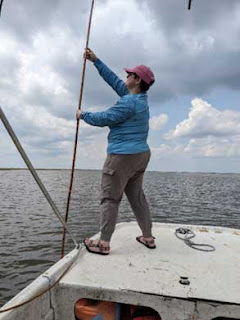 |
| Alyssa Outhwaite (left) and Becky Allee (right) in front of the Point-au-Chien Indian Tribe Building |
Hi! My name is Alyssa Outhwaite, I am a NOAA EPP/MSI CCME-II Scholar and a PhD candidate in Marine Biology at Texas A&M University-Corpus Christi. But what I’m really here to talk about is the amazing summer I spent as a NOAA EPP/MSI Experiential Research and Training Opportunity (NERTO) intern with the Gulf Region’s Office for Coastal Management.
This summer, I had the opportunity to work with the Pointe-au-Chien Indian Tribe (PACIT) of Terrebonne Parish, LA. I learned about their history and how lands have changed in the face of exploitation. I learned about their devotion to their homes and perseverance to maintain the important culture of their tribe in a changing world. Together we considered how alternative oyster culture (AOC) may be used to enhance social equity and environmental justice among their people. AOC is a potential sustainable way of growing oysters, where oysters are grown and harvested in bottom-placed or floating cages. While traditional oyster culture farming has been the way of the PACIT for generations, the concept of AOC is a relatively new one, and Louisiana in particular is interested in growing this industry.
As a part of this
internship, I received hands on experience working with the tribe as well as
behind the curtain operations of NOAA’s Office for Coastal Management. I was
able to collaborate with the federal government, state agencies, and the local
tribe to better understand the condition of Louisiana’s bayous, erosion
concerns, and where AOC might fit into that changing landscape. We started by
asking a simple question “are there suitable areas in which AOC can take place
that will benefit the PACIT?” This led me through a journey of mapping out
priority lands for the tribe and oyster leases in adjacent waters.
 |
| Alyssa Outhwaite giving a presentation on oyster aquaculture to the NOAA Gulf Region Collaboration Team |
One of my favorite experiences this summer was cruising out
into the bayou with a couple of the tribe’s oystermen to survey oyster leases,
where we documented the water’s temperature and salinity using a sonde, which is an instrument that transmits information about its surroundings from an inaccessible location such as underwater.
Donald Dardar (back left), Matt Bethel (back right),
Earl Melancon (front left), and Alyssa Outhwaite (front right)
surveying oyster leases in Terrebonne Parish Louisiana
We made a little competition of tasting the water before checking the salinity to see how close our guesses were to truth. For two experienced oystermen, I wasn’t surprised how spot on their estimates were.
From there we poled the water bottom to document the substrate type. ‘Poling’ an oyster lease is actually quite simple. One must simply possess the ability to balance along the deck of a boat, spearing their rod down into the water to the sediment below, and shout back to person holding pen and paper what sort of bottom lay underneath. ‘Mud’ for the soft and sticky, ‘Firm’ for the more unyielding, and ‘Reef’ for the clumps of oysters easily discerned by the shifting clink of the pole as it taps across shells. And you simply do this repeatedly as the boat captain motors steadily across the water. The end result is a profile of the bottom type, which is important for determining how well an oyster farm might fare.
 |
| Alyssa Outhwaite surveying oyster lease bottoms by "poling" in Terrebonne Parish, Louisiana |
This opportunity went far beyond learning more about NOAA and preparing me for a future in that industry. It helped me connect the important science we do to the people it impacts. It helped me better see where management can make a difference and how there is so much work that can be done for the underserved communities right in our own bayous.
______________________________________
Alyssa's NERTO internship was made possible by the National Oceanic and Atmospheric Administration (NOAA) Office of Education, Educational Partnership Program with Minority-Serving Institutions award #NA21SEC4810004 (NOAA Center for Coastal and Marine Ecosystems-II). The contents of this post are solely the responsibility of the award recipient and do not necessarily represent the official views of the U.S. Department of Commerce, NOAA.





